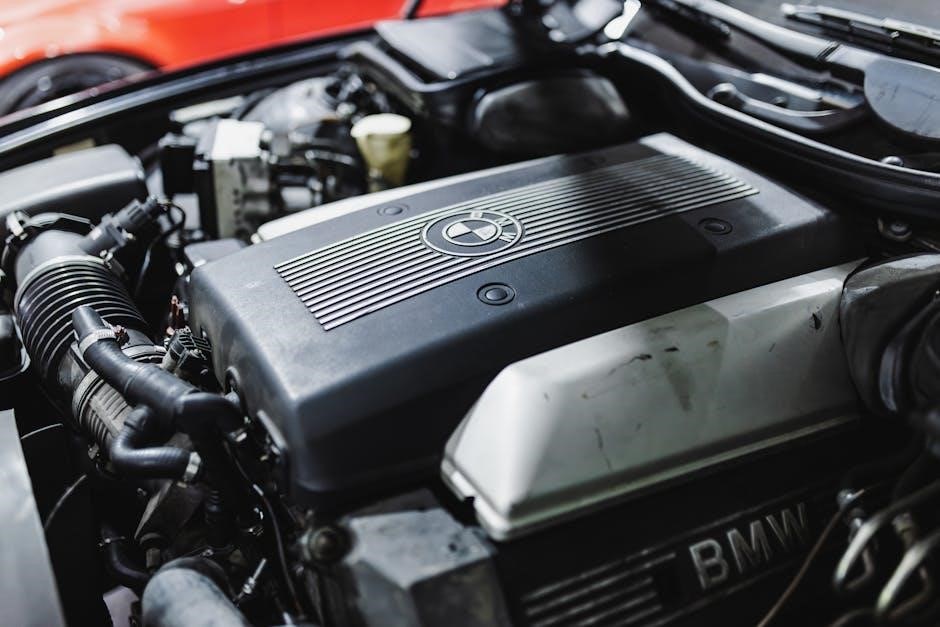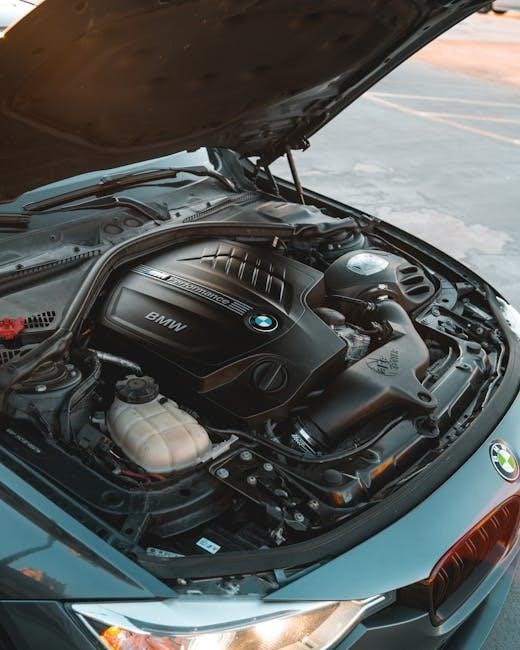The BMW X3 maintenance schedule PDF provides a comprehensive guide for owners to ensure optimal performance and longevity. It outlines recommended service intervals, oil changes, tire rotations, and inspections to keep your SUV running smoothly. By following the schedule, you can prevent potential issues and maintain your vehicle’s value. The PDF is downloadable from BMW’s official website and includes detailed instructions for DIY enthusiasts and professional mechanics alike. Regular maintenance is key to preserving the advanced technology and engineering of your BMW X3.
Importance of Regular Maintenance
Regular maintenance is crucial for preserving the performance, reliability, and longevity of your BMW X3. It ensures that all components function optimally, preventing unexpected breakdowns and costly repairs. By adhering to the recommended schedule, you maintain safety, fuel efficiency, and the overall driving experience. Regular servicing also protects your investment by maintaining the vehicle’s value and ensuring warranty coverage. Addressing issues early prevents minor problems from escalating, saving time and money in the long run while keeping your BMW X3 in peak condition.
Overview of BMW X3 Maintenance Schedule
The BMW X3 maintenance schedule is structured to ensure your vehicle receives necessary services at specific intervals. It includes oil changes every 5,000 to 7,500 miles, tire rotations, and inspections of brakes, belts, and fluids. The schedule is designed to optimize performance, prevent wear, and maintain reliability. By following the outlined services, you can address potential issues early, ensuring your BMW X3 remains in excellent condition while adhering to the manufacturer’s recommendations for longevity and efficiency.

Recommended Maintenance Intervals
BMW X3 maintenance intervals vary by mileage and usage, typically every 5,000 to 7,500 miles for oil changes, with tire rotations and inspections scheduled accordingly for optimal performance.
Oil Change Intervals
BMW recommends oil changes for the X3 every 5,000 to 7,500 miles, depending on driving conditions. Synthetic oil (SAE 0W-20 or 0W-12) is required for optimal engine performance. Always use genuine BMW oil to maintain warranty coverage and prevent engine damage. Non-approved oils can lead to internal engine issues over time. Refer to the maintenance schedule PDF for specific guidelines tailored to your X3 model and driving habits to ensure longevity and efficiency.
Tire Rotation Schedule
BMW X3 tire rotation is recommended every 5,000 to 7,500 miles to ensure even tread wear and optimal performance. Follow the specific pattern outlined in the maintenance schedule PDF for your vehicle. Regular rotations prevent uneven wear, improve handling, and extend tire life. Always check the owner’s manual for precise guidelines tailored to your X3 model. Proper tire maintenance enhances safety, fuel efficiency, and overall driving experience, keeping your BMW performing at its best.
Brake Inspection Frequency
The BMW X3 maintenance schedule recommends brake inspections every 12,500 miles to ensure safety and performance. This includes checking brake pads, rotors, and fluid levels. Regular inspections help identify wear early, preventing costly repairs. Adhering to this schedule ensures reliable braking performance and maintains your vehicle’s safety standards. Neglecting inspections can lead to reduced stopping power and increased risk of accidents, making it crucial to follow the recommended intervals outlined in the BMW X3 maintenance schedule PDF.

Scheduled Maintenance Services
Scheduled maintenance services for the BMW X3 include regular inspections and replacements to ensure optimal performance. These services are outlined in the BMW X3 maintenance schedule PDF, providing a clear guide for owners to follow. By adhering to these schedules, owners can maintain their vehicle’s health and longevity, ensuring reliability and safety on the road. Consistent servicing also helps prevent unexpected repairs and maintains the vehicle’s value over time.
Engine Oil and Filter Replacement
BMW recommends replacing the engine oil and filter every 5,000 to 7,500 miles, depending on driving conditions. Use Original BMW Engine Oil (SAE 0W-20 or 0W-12 for certain models) to ensure optimal performance. The oil filter should be replaced at the same time to maintain engine health. Neglecting this can lead to premature wear and potential engine damage. Always refer to the BMW X3 maintenance schedule PDF for specific intervals and guidelines tailored to your vehicle. Proper oil service is crucial for longevity and efficiency.
Tire Pressure Checks and Adjustments
Regular tire pressure checks are essential for optimal performance and safety. The BMW X3 maintenance schedule recommends checking tire pressure monthly and before long trips. Use the pressure specifications listed in the owner’s manual or on the tire information placard on the doorjamb. Properly inflated tires improve fuel efficiency, handling, and safety. Under-inflated tires can lead to uneven wear and reduced performance. Always check tires when they are cold for accurate readings and adjust as needed to maintain the recommended pressure for your driving conditions.
Brake Pad Replacement Guidelines
Regular brake pad inspections are crucial for safety and performance. The BMW X3 maintenance schedule recommends checking brake pads every 12,500 miles or when symptoms like squeaking or vibration occur. Replace pads when worn below 3mm to prevent rotor damage. Always use BMW-approved pads for optimal braking performance. Inspect rotors for wear or warping during pad replacement. Proper installation ensures even braking and extends the life of your braking system. Follow the guidelines in the PDF to maintain your X3’s stopping power and safety features.
Spark Plug Replacement Interval
The BMW X3 maintenance schedule recommends replacing spark plugs every 60,000 miles to ensure proper engine performance and fuel efficiency. Timely replacement prevents misfires and potential engine damage. Using genuine BMW spark plugs guarantees optimal combustion and longevity. Regular inspections can help identify worn plugs before they cause issues. Adhering to this interval maintains your vehicle’s reliability and preserves its power delivery.

Fluid Checks and Replenishment
Regular fluid checks ensure optimal engine performance and prevent damage. Check engine oil, coolant, transmission, and differential fluids as outlined in the BMW X3 maintenance schedule. Timely replenishment prevents overheating and wear, maintaining your vehicle’s smooth operation and longevity.
Engine Oil Level Check
Regular engine oil level checks are essential for maintaining your BMW X3’s performance and longevity. Ensure the vehicle is on a level surface and the engine is warm. Use the dipstick or electronic oil level sensor to verify the oil level. Top up with the recommended oil type (e.g., SAE 0W-20 or 0W-12) if levels are low. Check the owner’s manual for specific guidance or consult a professional if unsure. Regular checks prevent engine damage and ensure smooth operation.
Coolant Level Inspection
Regular coolant level inspections are crucial for maintaining your BMW X3’s engine health. Check the coolant reservoir when the engine is cool to avoid inaccurate readings. Ensure the level is between the minimum and maximum marks. Top up with a 50/50 mix of BMW-approved coolant and distilled water if needed. Avoid overfilling, as this can cause system pressure issues. Inspect the reservoir for cracks or leaks and address any concerns promptly to prevent overheating and potential engine damage.
Transmission Fluid Check
Regular transmission fluid checks are essential for ensuring smooth gear shifts and preventing damage. Locate the transmission fluid dipstick under the hood, typically labeled or color-coded. Pull it out, wipe it clean, and insert it again to get an accurate reading. Check the level against the dipstick’s markings and look for any signs of dark or dirty fluid; If the level is low, top it off with BMW-approved fluid. Inspect for leaks around the transmission pan. Adhere to the maintenance schedule for fluid changes to maintain optimal performance and avoid costly repairs.
Differential Fluid Inspection
Inspecting the differential fluid is crucial for maintaining the BMW X3’s all-wheel-drive system. Check the fluid level by locating the differential’s fill plug, typically at the rear axle. Remove the plug and ensure the fluid level reaches the bottom of the hole. Look for clear, amber-colored fluid; if it’s dark or contaminated, schedule a change. Leaks around the differential should be addressed immediately. Refer to the maintenance schedule for recommended fluid change intervals, usually every 30,000 to 60,000 miles, depending on driving conditions.
Battery Maintenance
Regular battery checks ensure reliable starting and electrical system performance. Avoid deep discharges and charge the battery correctly to prevent degradation. Monitor age-related wear and refer to the PDF for guidelines.
Battery Health Check
Regular battery health checks are crucial for ensuring reliable performance. Inspect terminals for corrosion and clean them if necessary. Monitor the battery’s state of charge and look for signs of wear. Check the battery case for cracks or swelling, which may indicate internal damage. Test the battery’s voltage and cold-cranking amps to assess its condition. Refer to the BMW X3 maintenance schedule PDF for guidelines on when to replace the battery, typically every 5-7 years, depending on usage and conditions.
Battery Charging Guidelines
Proper charging is essential for maintaining battery health. Use BMW-approved chargers to ensure compatibility and safety. Avoid fast charging, as it may degrade the battery. Charge in a well-ventilated area to prevent hydrogen buildup. Monitor the charging temperature, as extreme heat can damage the battery. Do not overcharge, as this can reduce lifespan. Always follow the recommended charging procedures outlined in the BMW X3 maintenance schedule PDF to ensure optimal performance and longevity of your vehicle’s battery system.
Battery Replacement Recommendations
The BMW X3 maintenance schedule PDF advises replacing the battery every 5-7 years or when signs of wear appear, such as slow engine crank or dimming lights. Use BMW-approved batteries to ensure compatibility and performance. When replacing, disconnect the negative terminal first and follow proper safety precautions. Avoid mixing old and new batteries in dual-battery systems. Refer to the PDF for specific guidelines and consult a professional if unsure to maintain your vehicle’s electrical system integrity and reliability.
Accessing the BMW X3 Maintenance Schedule PDF
The BMW X3 maintenance schedule PDF is available on BMW’s official website, covering models from 2016 to 2025. Download it for detailed service guidance and troubleshooting tips.
Downloading the PDF from BMW’s Official Website
The BMW X3 maintenance schedule PDF can be easily downloaded from BMW’s official website. Simply navigate to the support or owner’s resources section, select your vehicle model and year, and access the PDF manual. This document provides detailed maintenance schedules, oil change intervals, tire rotation guidelines, and other essential service recommendations. It serves as a valuable resource for both DIY enthusiasts and professional mechanics, ensuring your BMW X3 remains in optimal condition.
Reading and Understanding the PDF Document
The BMW X3 maintenance schedule PDF is designed to be user-friendly, with clear sections detailing service intervals, oil changes, and tire rotations. It’s organized by mileage or time, making it easy to track when specific services are due. The document includes diagrams and charts to help owners understand complex procedures. Regularly reviewing the PDF ensures you stay informed about recommended maintenance, helping you keep your BMW X3 in peak condition and avoid potential issues down the road.
Tools and Resources Needed for Maintenance
Performing BMW X3 maintenance requires specific tools like a socket set, torque wrench, and oil filter wrench. Ensure you use BMW-recommended fluids, such as SAE 0W-20 or 0W-30 engine oil, depending on your engine type. Refer to the PDF for exact specifications and part numbers. Additional resources include diagnostic tools like BMW ISTA/D or INPA for advanced troubleshooting. Always consult the owner’s manual or BMW’s official website for updated guidelines and technical support to maintain your vehicle effectively.
DIY vs. Dealership Maintenance
DIY maintenance saves money and is ideal for simple tasks, while dealership servicing offers expertise and genuine parts, ensuring compliance with BMW’s standards and warranty requirements.
Pros and Cons of DIY Maintenance
DIY maintenance offers cost savings and a sense of accomplishment for BMW X3 owners. It allows for hands-on learning and can be more convenient for simple tasks like oil changes. However, improper repairs can lead to costly issues, and using non-approved parts may void warranties. DIY also requires tools and mechanical expertise, which not all owners possess. Balancing these factors is crucial for deciding between DIY and professional servicing.
Benefits of Dealership Servicing
Dealership servicing ensures your BMW X3 receives expert care from certified technicians using genuine parts. This maintains performance, safety, and resale value. Dealerships have access to the latest tools and technology for precise diagnostics and repairs. They also honor warranty terms and provide detailed maintenance records. Additionally, dealerships often offer convenience services like loaner vehicles and shuttle services, making the process hassle-free. This level of professional attention ensures your SUV operates at peak efficiency and reliability.

Maintenance Cost Estimates
Maintenance costs for BMW X3 vary based on services needed, such as oil changes, tire rotations, and inspections. Following the schedule helps prevent major repairs and ensures longevity.
Estimated Costs for Routine Services
Estimated costs for routine services on a BMW X3 vary depending on the type of maintenance required. Oil changes typically range between $100 to $200, while tire rotations cost around $50 to $100. Brake inspections are usually free but may lead to additional costs if repairs are needed. Regular inspections can cost $200 to $500, depending on the service package. These estimates help owners budget for scheduled maintenance, ensuring their vehicle remains in optimal condition without unexpected expenses.
Common Repair Costs and Preventative Measures
Common repairs for the BMW X3 include brake pad replacements, which can cost between $300 and $600, and spark plug replacements, typically priced around $200 to $400. Regular inspections can help identify issues early, preventing costly repairs. Preventative measures like timely oil changes and tire rotations ensure optimal performance and extend the vehicle’s lifespan. By adhering to the maintenance schedule, owners can avoid expensive fixes and maintain their BMW X3’s reliability and efficiency over time;
Troubleshooting Common Issues
The BMW X3 maintenance schedule PDF helps identify and address common issues, such as reduced performance or warning lights, through diagnostic checks and timely repairs.
Using the BMW X3 Computer for Diagnostics
The BMW X3’s advanced computer system allows owners to monitor vehicle health and diagnose issues. It displays maintenance alerts, service messages, and error codes, enabling proactive care. The system tracks mileage, driving conditions, and wear on components, providing timely reminders for oil changes, tire rotations, and inspections. Accessing these diagnostics through the dashboard or connected app helps identify potential problems early, ensuring adherence to the maintenance schedule and preventing costly repairs. This feature is a valuable tool for keeping your X3 in optimal condition.
Identifying and Addressing Common Maintenance Issues
Regularly reviewing the BMW X3 maintenance schedule PDF helps identify common issues early. Look for signs like oil leaks, uneven tire wear, or brake noise. Addressing these promptly prevents major repairs. The schedule outlines checks for oil levels, tire pressure, and brake pads. Stay proactive by following the recommended intervals for fluid changes and inspections. Early detection ensures your X3 runs smoothly and maintains its performance. Always consult the PDF for specific guidance tailored to your vehicle’s needs.
When to Consult a Professional Mechanic
If you encounter complex issues beyond basic DIY maintenance, such as unusual engine noises, advanced electrical problems, or transmission concerns, consult a professional mechanic. They specialize in diagnosing and repairing intricate systems unique to BMW vehicles. Additionally, if you’re unsure about procedures like spark plug replacement or fluid checks, seeking expert advice ensures the job is done correctly. This is especially important for maintaining warranty coverage and preventing costly damage from improper repairs.
Warranty and Coverage
Your BMW X3 may come with a manufacturer warranty covering parts and labor for defective components. Extended warranty options are available for added protection beyond the standard period.
Manufacturer Warranty Coverage
The BMW X3 comes with a manufacturer warranty that typically covers parts and labor for defective components for a specified period or mileage. This coverage ensures protection against unexpected repair costs and helps maintain your vehicle’s performance and reliability. The warranty duration varies by region and model year but generally includes a new vehicle limited warranty for up to 4 years or 50,000 miles. This coverage is designed to provide peace of mind and safeguard your investment in the BMW X3.
Extended Warranty Options
Extended warranty options for the BMW X3 provide additional protection beyond the manufacturer’s standard warranty. These plans can be purchased after the factory warranty expires and offer coverage for parts and labor on major components. Coverage durations vary but typically extend up to 7 years or 100,000 miles. Extended warranties can be tailored to your needs and may include benefits like roadside assistance. They are transferable, adding value if you sell your vehicle. These options ensure continued peace of mind and financial protection for your BMW X3 investment.
Certified Pre-Owned (CPO) Maintenance Benefits
Purchasing a Certified Pre-Owned (CPO) BMW X3 comes with exclusive maintenance benefits. These vehicles undergo rigorous multi-point inspections to ensure they meet BMW’s high standards. CPO owners receive extended warranty coverage, covering repairs and replacements for parts and labor. Additionally, CPO programs often include complimentary maintenance services for a specified period or mileage. This provides peace of mind and financial savings for owners. The CPO designation also includes detailed maintenance records, ensuring transparency and confidence in your vehicle’s history and condition.

Best Practices for BMW X3 Owners
Adhere to the recommended maintenance schedule, use genuine BMW parts, and perform regular checks. Address any issues promptly to ensure reliability and longevity of your vehicle.
Keeping Maintenance Records
Maintaining detailed records of your BMW X3’s maintenance is essential for tracking service history and ensuring compliance with the recommended schedule. Keep a log of oil changes, tire rotations, and repairs. Use the BMW X3 maintenance schedule PDF as a guide to document each service. Note the date, mileage, and type of work performed. This helps in planning future services and provides proof of proper care, which can be beneficial for warranty claims or resale value. Store both physical and digital copies securely for easy access.
Understanding Service Indicators
Your BMW X3 features advanced service indicators that notify you when maintenance is due. These indicators, displayed on the dashboard, provide reminders for oil changes, inspections, and other scheduled services. The system calculates intervals based on mileage and driving conditions. Familiarize yourself with these alerts to ensure timely servicing. Refer to the BMW X3 maintenance schedule PDF for detailed guidelines on interpreting and responding to these indicators. Regular monitoring helps prevent potential issues and keeps your vehicle running smoothly.
Preparing for Scheduled Services
Before your BMW X3’s scheduled service, review the maintenance schedule PDF to understand the required work. Check the dashboard for any service alerts and organize your maintenance records. Ensure you have the recommended materials, such as the correct oil grade, and address any specific needs highlighted in the schedule. This preparation helps ensure a smooth and efficient service experience, keeping your vehicle performing at its best and extending its lifespan.
Adhering to the BMW X3 maintenance schedule ensures optimal performance, longevity, and value retention. Regular servicing prevents issues and keeps your SUV running smoothly for years to come.
Final Thoughts on BMW X3 Maintenance
Proper maintenance is crucial for the BMW X3’s performance and longevity. Regular oil changes, tire rotations, and inspections ensure reliability and prevent costly repairs. Following the PDF schedule helps maintain warranty coverage and preserves resale value. DIY and dealership options offer flexibility, while staying informed about service indicators and fluid levels keeps your SUV in peak condition. Consistent care ensures a smooth, enjoyable driving experience for years to come.
Encouragement for Regular Servicing
Regular servicing is essential to maintain your BMW X3’s performance, reliability, and longevity. By following the recommended maintenance schedule, you ensure optimal functionality, safety, and fuel efficiency. Adhering to the PDF guidelines prevents potential issues, reduces repair costs, and preserves your vehicle’s value. Consistent care also maintains warranty coverage and enhances resale value. Stay proactive with routine checks to enjoy a smooth, worry-free driving experience and keep your BMW X3 in peak condition for years to come.

